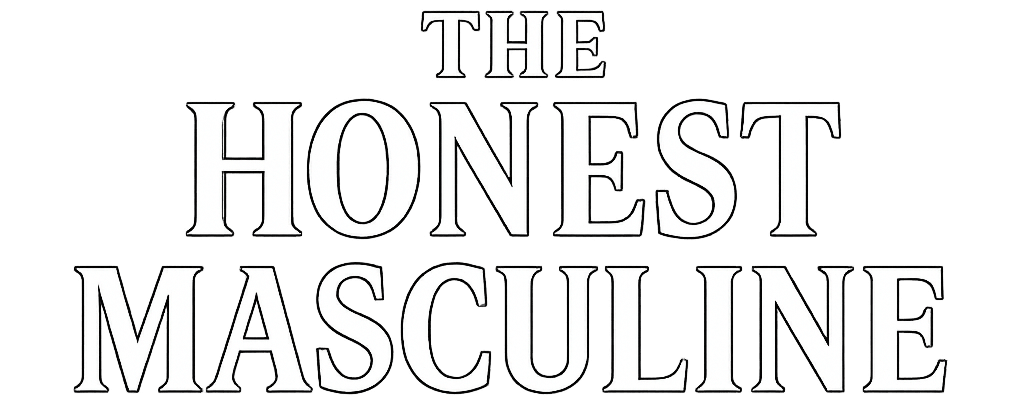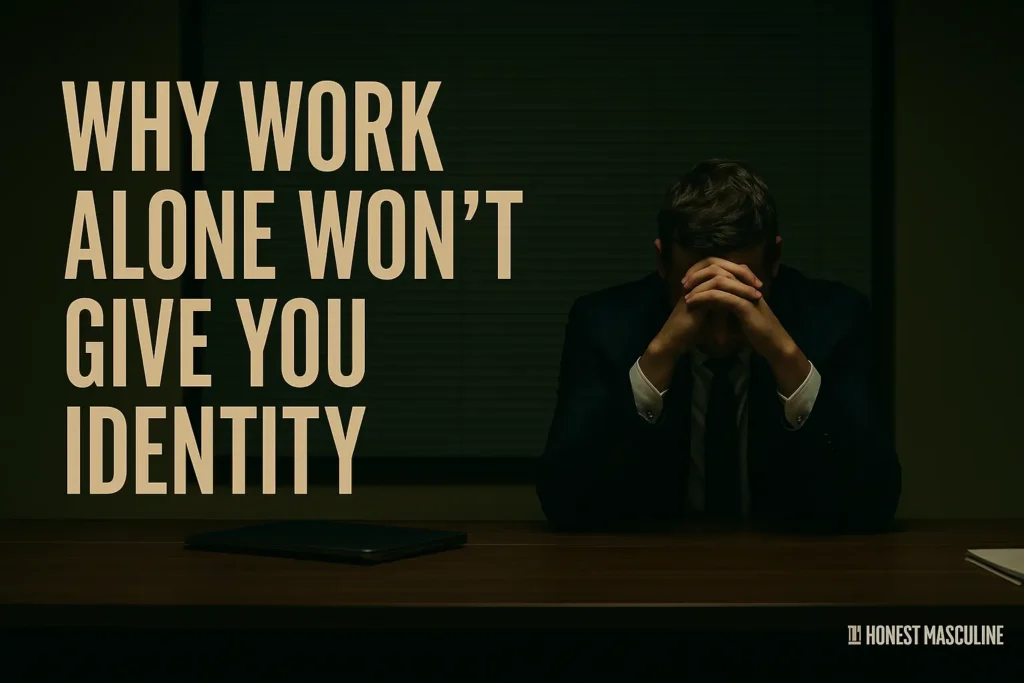
Table of Contents
Introduction
Most men think if they just grind hard enough, their job will define them. Get the promotion. Build the company. Make the money. And somewhere along the way, they expect all that work to turn into identity — proof that they matter.
But here’s the truth: work alone doesn’t give you identity. It gives you a role. And a role can be stripped away in a second.
Lose the job, and suddenly the identity you built around it vanishes too. The guy who lived as “the banker,” “the manager,” or “the entrepreneur” suddenly wakes up unemployed, divorced, and asking the same question 19-year-olds ask: Who the hell am I?
Don’t get me wrong — work matters. It’s a piece of the puzzle. But when you make it the whole puzzle, you set yourself up for collapse.
Because identity doesn’t come from your business card. It comes from something deeper: the purpose you serve, the standards you live by, the brotherhood you belong to, and the legacy you’re building.
Work is a tool. You are the builder. And if you confuse the two, you’ll spend your life slaving for a title that won’t even make it onto your gravestone.
The Myth of Work = Identity
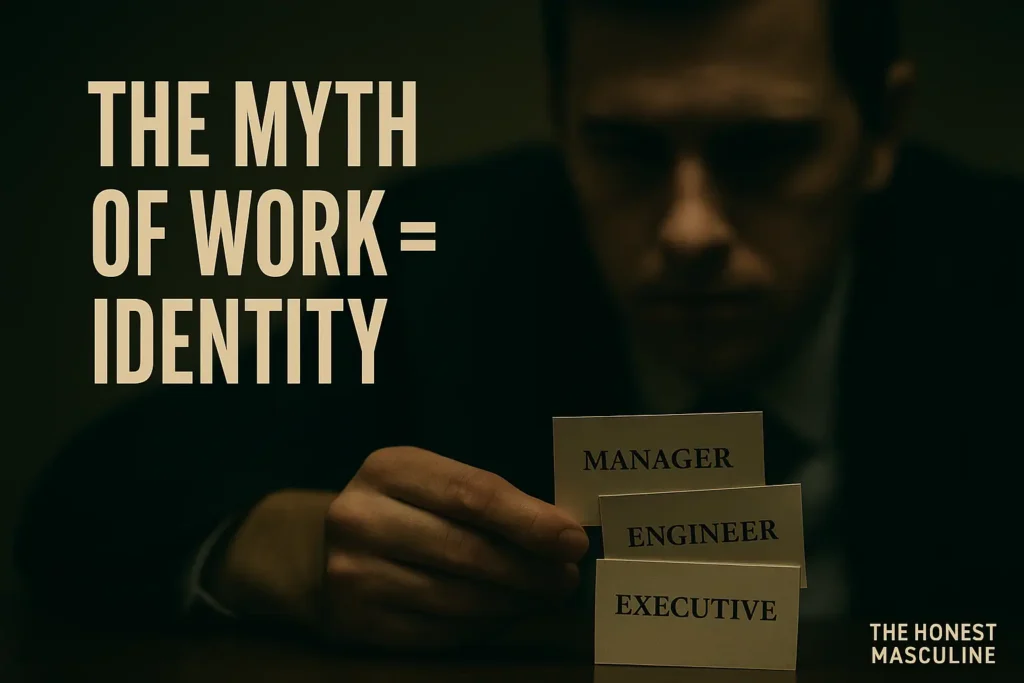
From the time we’re kids, men get fed the same script: “What do you want to be when you grow up?” And notice how the answers are always job titles — doctor, lawyer, firefighter, engineer. Nobody ever says, “I want to be a man with integrity, discipline, and a mission.”
Our culture has reduced identity to occupation. “What do you do?” has become shorthand for “Who are you?” And most men play along.
At first, it makes sense. Work is where men spend most of their waking hours. It’s how we provide. It’s how we gain status. It’s one of the few arenas left where effort translates into measurable results. Promotions, pay raises, titles — these are the scoreboards society recognizes.
But here’s the trap: your job isn’t you. It’s a role. A role that can vanish.
Companies collapse. Industries die. Bosses replace you. Economies shift. If your entire sense of self is built on a business card, then your identity is as fragile as the market.
That’s why you see men fall apart after layoffs, divorces, or retirement. Their whole life was tied up in what they did for money. Once that disappears, they realize there’s nothing else underneath. No core. No backbone. No self.
Work alone won’t give you identity because identity can’t be outsourced to a corporation. It’s not written on a paycheck. It’s forged in your standards, your purpose, your relationships, and the way you face the world when nobody’s handing you a gold star.
Your job is what you do. Your identity is who you are. And confusing the two is the reason so many men end up lost, burnt out, and broken.
Why Men Default to Work as Identity
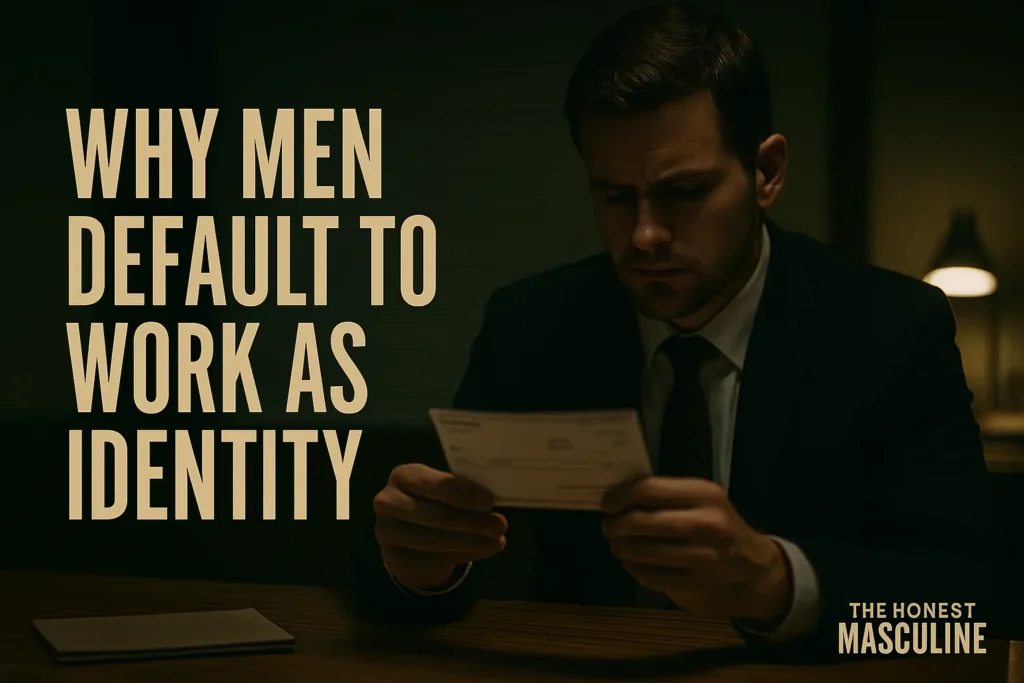
If you’ve ever noticed, when men meet each other for the first time, the second question after “What’s your name?” is almost always “So, what do you do?”
It’s not by accident. Work is the easiest way men size each other up. It’s how we gauge status, respect, and even whether someone is worth listening to. A man with a strong job title gets instant credibility. A man without one gets dismissed.
And that’s exactly why so many men default to work as their identity.
1. Work Feels Measurable
Men love scoreboards. We need to know if we’re winning. Work provides one: promotions, paychecks, performance reviews. Even if the system is broken, it still gives us a scoreboard to chase.
2. Society Rewards Productivity
Modern culture doesn’t care much about who you are. It cares about what you produce. If you’re constantly working, you’re seen as valuable. If you’re not, you’re disposable. For most men, their worth is tied directly to output.
3. Respect is Craved, and Work Provides It (Temporarily)
Work gives men a way to earn respect. A man can show up, grind, deliver results — and he gets recognition. It’s not always deep respect, but it’s something. And when men aren’t building respect through brotherhood, character, or purpose, they cling to the shallow respect that comes from their job.
4. It’s the Path of Least Resistance
Let’s be real — building identity through character, purpose, or legacy takes work most men don’t want to face. It’s easier to bury yourself in a job than to confront your own emptiness. Work becomes a socially acceptable distraction from deeper questions.
But here’s the catch: while work feels like identity, it’s not. It’s borrowed. The second you’re out of the job, the respect vanishes. The scoreboard resets. The “identity” collapses.
Men default to work as identity because it’s easy, measurable, and rewarded. But it’s also shallow, fragile, and temporary.
The Cost of Making Work Your Only Identity
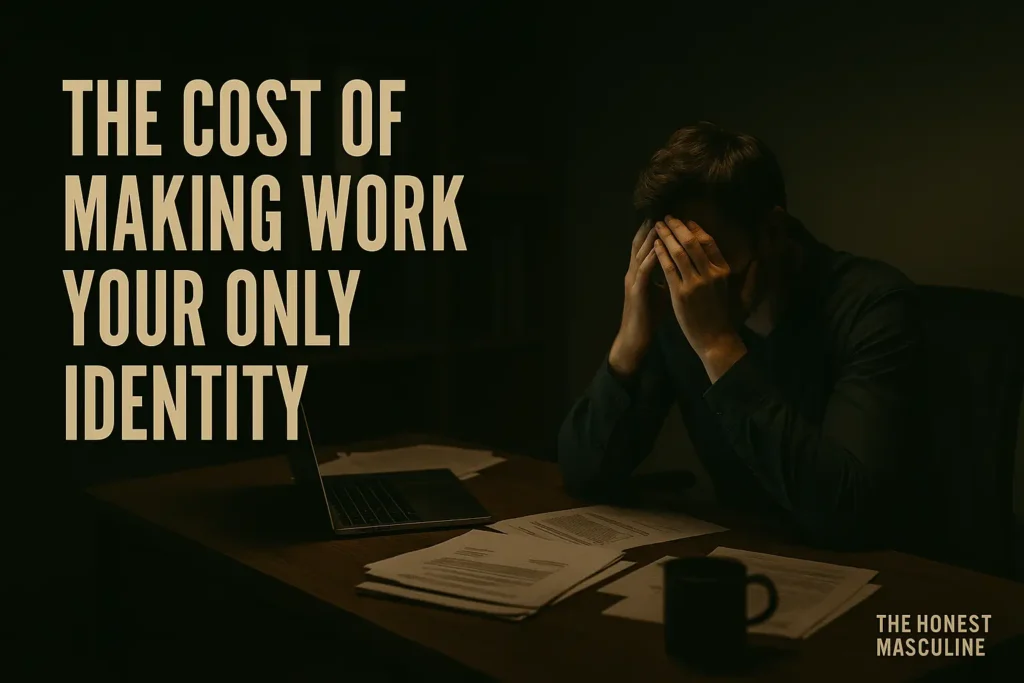
When men make work their identity, it feels noble at first. You’re hustling. You’re providing. You’re achieving. Everyone praises your drive.
But scratch beneath the surface, and the cost is brutal.
1. Burnout Becomes Your Default State
If your whole self-worth is tied to performance, you’ll never feel like you’ve done enough. One promotion just means the next one. One win just raises the bar. Work becomes an endless treadmill. You run harder, but you never arrive. And eventually, your body, mind, and soul collapse under the weight of constant grind.
2. Collapse When the Job Disappears
What happens when you get laid off? Or retire? Or your industry gets swallowed up by automation? Men who tied everything to their career face an identity death. They don’t just lose income — they lose themselves. That’s why so many men spiral after retirement. If you were only “the manager” or “the engineer,” then who are you when you’re not?
3. Broken Relationships
Workaholic men often think they’re being responsible. But their wives and kids don’t see responsibility — they see absence. They see a man glued to his laptop instead of present at the dinner table. They see a father who bought them things but never gave them himself. Careers have ruined more families than unemployment ever did.
4. Regret That Hits Too Late
The cruelest cost is regret. The man who worked 60-hour weeks for decades eventually realizes nobody cares about his job title. Nobody visits his grave to thank him for staying late at the office. He traded his identity for a role that was temporary, and by the time he realizes it, it’s too late to get it back.
Work is a piece of the puzzle, but when it becomes the whole picture, it hollows you out.
Men who make work their identity end up burnt out, disconnected, and forgotten. Because when the job ends — and it will — so does the fragile identity built around it.
What Actually Builds Masculine Identity

If work alone won’t give men identity, then what does? The answer is both simpler and harder than most guys want to hear. Masculine identity isn’t handed to you by a boss or a company. It’s forged in the way you live your life — with or without the paycheck.
1. Purpose Beyond Paychecks
A man with purpose is unshakable. He might still hustle at work, but his mission isn’t tied to the company’s quarterly earnings. It’s tied to something deeper — providing for his family, building a legacy, shaping himself into someone stronger. Work supports his purpose. It doesn’t define it.
2. Character and Standards
Your real identity is who you are when nobody’s clapping. Do you keep promises to yourself? Do you live with integrity when nobody’s watching? Do you hold the line when it would be easier to cave? Men who build standards build identity. Men who don’t get swallowed by the identity of the herd.
3. Brotherhood and Relationships
You can’t build identity in isolation. Men sharpen men. A man surrounded by strong brothers, mentors, and peers grows sharper, stronger, more anchored. A man without them drifts. Work might get you colleagues, but brotherhood gets you identity.
4. Legacy
Work dies with you. Legacy outlives you. Your masculine identity is measured not just in what you achieved, but in what you left behind. The kids you raised. The values you embodied. The strength you passed down. That’s identity that can’t be outsourced, fired, or erased.
Identity isn’t built on your résumé. It’s built on your standards, purpose, brotherhood, and legacy. Work helps — but it can’t carry the whole load.
How to Work Without Losing Yourself
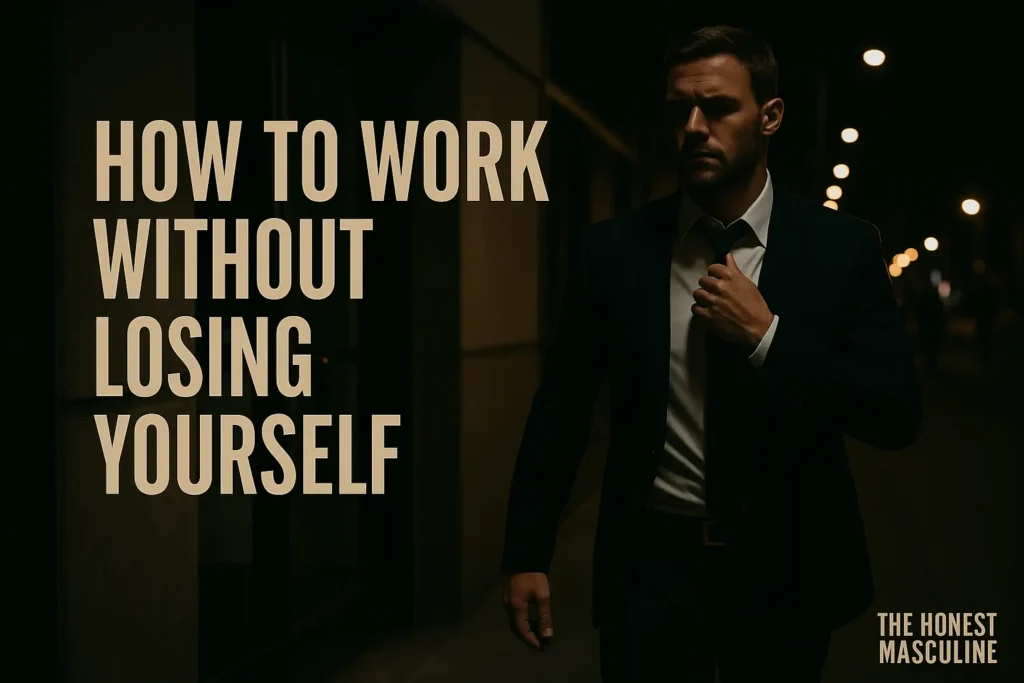
Work isn’t the enemy. Work is necessary. It’s how you provide, grow, and sharpen yourself. The problem is when you confuse work with identity. The key is learning how to work without losing yourself in it.
Here’s how:
1. Treat Work as Part of Your Mission, Not the Whole Thing
Work should fuel your mission, not define it. If your only mission is climbing the corporate ladder, you’re a cog. If your work supports a bigger vision — like raising a strong family, building financial freedom, or leaving a legacy — then work becomes a tool, not a trap.
2. Set Boundaries That Protect You
If you’re always on call, always available, always grinding, then you don’t own your work — it owns you. Set boundaries. Clock out. Protect time for your health, your relationships, and your own development. Your job exists to serve your life, not the other way around.
3. Build Outside of Work
The strongest men build something beyond their career. Train your body. Learn new skills. Write. Mentor. Start a side project. These things create identity that no boss can strip from you. A man who only has his career is one layoff away from collapse.
4. Redefine Success for Yourself
Most men chase society’s scoreboard: money, titles, status. Redefine it. Success isn’t just what you make — it’s what you build, who you become, and how much peace you carry. Work can be part of that, but it should never be the whole definition.
Work is a tool. You are the builder. Use it. Leverage it. But don’t ever let it become the only thing that defines you.
Conclusion
Work matters. It’s where you sharpen yourself, provide for the people you love, and test your grit against the world. But work alone won’t give you identity.
Because identity isn’t a job title. It’s not a paycheck. It’s not the company logo on your business card.
If all you are is your job, then you’re replaceable. The day the company lets you go, or the day you retire, your so-called “identity” dies with it. That’s why so many men collapse when work disappears — there’s nothing deeper underneath.
Your true masculine identity is built on purpose, standards, brotherhood, and legacy. Work is just one tool among many. Important, yes. Defining, no.
So here’s the truth: if you want to know who you are, stop hiding behind what you do.
Because at the end, nobody remembers the man who only worked. They remember the man who built himself into something greater.
👉Want to reclaim your life?
Join My Newsletter The Honest Masculine weekly newsletter — and you’ll get instant access to my (The Masculine Comeback: A 7-Day Reset for Men Who Feel Lost). No fluff, no filters. Just raw truths about breakups, masculinity, fatherhood, and the quiet battles men face alone.
It’s for the man who’s done pretending.

If you like my content? Let me know by Buying me a coffee. Thanks 🙂
